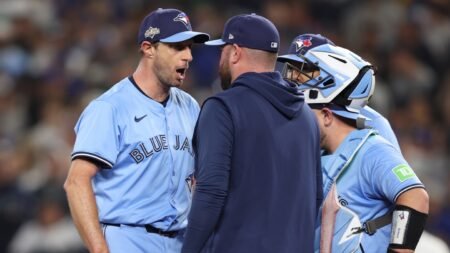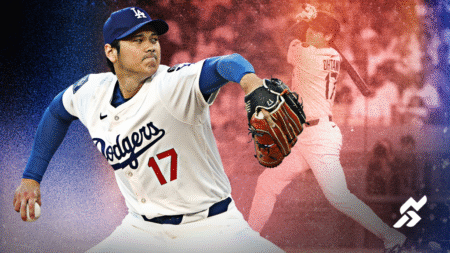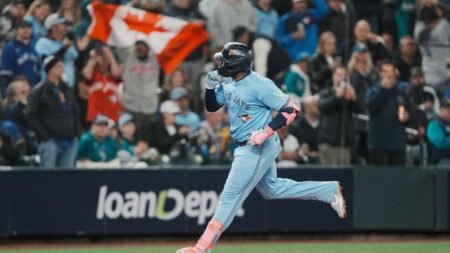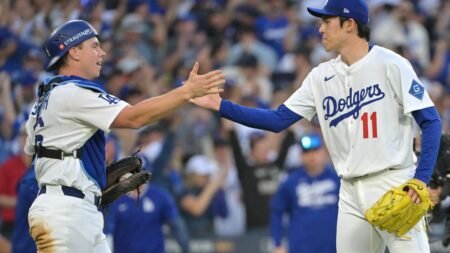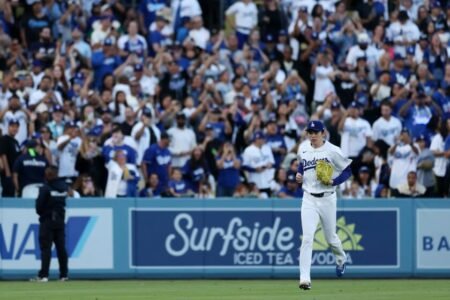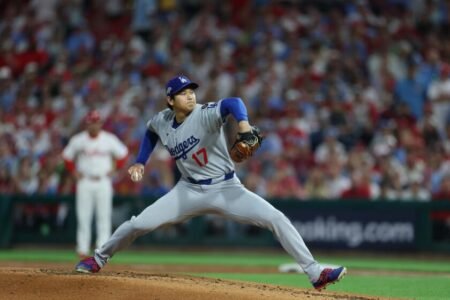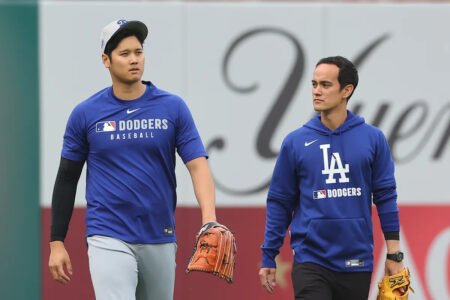SEATTLE — Three Cy Young Awards. Two no-hitters. Eight All-Star games. Two World Series championships.
Max Scherzer has done it all, seen it all, won it all. The 41-year-old future first-ballot Hall of Famer has accomplished virtually everything a pitcher could possibly dream of on a baseball field.
Advertisement
Except for this.
On Thursday in the bottom of the third inning of ALCS Game 4, Mariners second baseman Leo Rivas drew a walk against Scherzer to lead off the frame. The Blue Jays had just staked Scherzer to a 3-1 lead, but Rivas reaching base as the No. 9 hitter presented a golden opportunity for the top of the Mariners’ lineup to rally their way back into the ballgame. And Scherzer, who had a 10.20 ERA in four September starts and hadn’t pitched since Sept. 24, was expected to be on a short leash at the first sign of trouble. Randy Arozarena skied one to left field for the first out, but then MVP candidate Cal Raleigh strode to the plate to raise the stakes.
After two pitches, the count was 1-1. Rivas took his lead at first. The pitch clock ticked down. One bad pitch to Raleigh, and the game could be tied. Scherzer came set, readied and fired … to first base.
With Rivas floating off the bag, Scherzer whipped around and threw to first baseman Vladimir Guerrero Jr., who snapped a tag down on Rivas as he dove back. First-base umpire D.J. Reyburn initially ruled Rivas safe, but replay review initiated by a Toronto challenge revealed that Guerrero’s tag was in time, and Rivas was out.
Advertisement
It was the first time Scherzer had picked off a baserunner in the postseason.
With the bases suddenly empty, Raleigh seemed a lot less daunting. And two pitches later, Scherzer sat down the star catcher, coaxing a hapless wave at a curveball for strike three to end the inning. The moment marked a pivotal momentum shift for Toronto en route to an 8-2 victory that evened the series at two games apiece.
“I got the pick-off call from the PitchCom and just tried to wait out the clock as long as I could and then make a good snap throw. It wasn’t my best throw, but obviously, I put it in the right spot, so Vladdy could get the tag,” Scherzer said afterward. “That was a big turning point in the game to allow me to stay aggressive at them.”
Advertisement
Said Toronto manager John Schneider postgame: “The thing about Max is he really understands the game. I think when the disengagement rules kind of came in, he was always a guy that kind of just lobbed the ball over to first, didn’t really care about the running game … but it’s something that he’s worked on. He’s 41, and he’s still working on his craft.”
In some respects, the fact that this rally-squashing pickoff was a first-time October feat for Scherzer isn’t especially surprising. He has only eight career pickoffs in 2,963 regular-season innings. The last time he picked off a runner was Aug. 30, 2016, and that was Freddy Galvis dancing off second base. The last time Scherzer picked off a runner at first was Sept. 15, 2013.
Pickoffs have never been a primary part of his profile — with good reason. Rarely throughout his legendary career has Scherzer needed to worry much about controlling the running game. For one, prime Scherzer wasn’t allowing an amount of traffic on the bases that would require such strategies. And even when batters did reach, Scherzer was often dominant enough to make the pitches to navigate out of trouble, rather than trying to eliminate baserunners via pickoff.
But considering the sizable sample — Scherzer’s 17 outs recorded in Game 4 brought his career playoff total to 148 2/3 innings, moving him ahead of Whitey Ford and John Lackey into 10th on the all-time postseason innings list — it’s remarkable that never before had he nabbed a napping runner in October.
The pickoff stood out as the most out-of-character moment for Scherzer in Game 4, but everything else about his outing was entirely on brand — and reflective of his longstanding reputation as the ultimate competitor. It wasn’t the smoothest start to the evening, with Scherzer allowing a solo blast to Josh Naylor to open the scoring in the second inning. But much like Shane Bieber the night before, Scherzer got better as the game went along. His stuff was crisp — his 96.5-mph fastball to Raleigh in the first was the hardest pitch he has thrown since June 24, 2023 — and his command and execution of his secondary offerings improved as the outing progressed.
Advertisement
The pinnacle of Scherzer’s performance came in the fifth inning, when Arozarena came to the plate with two outs and a runner on first. Hard-throwing reliever Louis Varland was warming up. Even with a 5-1 lead and Scherzer at only 70 pitches, it felt like a sensible time for a manager to make a pitching change, especially with the top of Seattle’s lineup preparing to face Scherzer a third time. But as Schneider departed the dugout and headed toward the mound, it became clear that Scherzer had no interest in exiting the game.
“It was awesome,” Schneider said afterward. “I thought he was going to kill me. It was great. He locked eyes with me, both colors, as I walked out.”
Once Schneider arrived on the hill, Scherzer began to state his case with ferocity.
“I understood where the game state was, knew how I wanted to attack, and then all of a sudden, I saw Schneids coming out, and I kind of went, ‘Woah, woah, woah, I’m not coming out of this ball game. I feel too good,’” Scherzer said postgame. “So we had a little conversation that basically I wanted to stay in the ball game, but just with some other words involved. I just knew I was strong. I knew I wanted the ball. I knew I could get outs in this situation. I just wanted to stay in. I wanted it.”
After the animated insistence from Scherzer that he wasn’t going anywhere, Schneider retreated to the dugout. Four pitches later, Arozarena did the same, having flailed at a curveball for strike three. In completing the fifth, Scherzer ensured himself the chance to record the win, which he ultimately did, marking his first postseason win since Game 1 of the 2019 World Series.
Advertisement
“I’ve been waiting for that all year, for Max to yell at me on the mound,” Schneider said. “I think at that point, there’s numbers, there’s projections, there’s strategy, and there’s people. So I was trusting people. I think in that moment, you kind of relive every conversation I’ve had with him over the course of the year, and I trusted him to make pitches.”
After that third out, it would’ve been entirely reasonable for Schneider to pull the plug and guarantee Scherzer end his outing on a good note. But how the pitcher looked — and how he continued to talk in the dugout — gave the Blue Jays manager the confidence to send Scherzer back out for the sixth against Seattle’s best bats.
“When a guy is in it, when a guy is in the arena performing and doing well, I’m going to trust him to continue to do it,” Schneider said.
And once again, Scherzer rewarded his skipper, inducing a flyout from Raleigh and striking out Julio Rodriguez with a wicked slider. After a walk to Jorge Polanco, Scherzer was finally finished, making way for a quartet of Jays relievers to record the final 10 outs.
Advertisement
“He lives for this. You have to respect that, and you have to appreciate that,” Schneider said. “… That’s why he’s going to the Hall of Fame.”
At 41 years, 81 days old, Scherzer became the oldest pitcher to start a postseason game since eternal southpaw Jamie Moyer (45 years, 342 days) took the ball for the Phillies in Game 3 of the 2008 World Series. Moyer was also in the building Thursday, throwing out the ceremonial first pitch. A member of the Mariners’ Hall of Fame after spending 11 of his 25 major-league seasons with Seattle, Moyer received a warm welcome from the sold-out crowd of 46,981 — an ovation that turned out to be one of the loudest cheers of the night from the home fans.
Advertisement
Because as Scherzer’s vintage performance unfolded, the Blue Jays’ bats picked up right where they left off in their 18-hit, 13-run showing in Game 3. Toronto knocked Seattle starter Luis Castillo out in the third, with shortstop Andres Gimenez delivering an unlikely home run for the second game in a row to seize a 2-1 lead. The Jays continued to add on against some of the top Mariners relievers, tagging lefty Gabe Speier with two more runs, scoring on a wild pitch from Matt Brash and getting another humongous swing from Guerrero for a solo homer off Eduard Bazardo. Addison Barger — making his first start in right field since Sept. 6 — was the star on defense, throwing out Naylor at third to quell a Mariners rally in the sixth and making a diving catch to rob Rivas of extra bases to end the seventh.
For the second straight night, the Blue Jays looked like the superior ballclub in every facet. And by evening the series and ensuring the action will return to Rogers Centre for Game 6 (at least), they reclaimed the home-field advantage they squandered earlier in the series. The ALCS now effectively shrinks to a best-of-three, beginning Friday in Game 5, with a pitching rematch between veteran Kevin Gausman and 27-year-old Bryce Miller. These two right-handers were both mostly good in Game 1, with Miller getting the edge by completing six frames while Gausman surrendered the lead in his sixth inning of work. Even so, Game 5 would seem to favor Toronto, based on Gausman’s more substantial track record and how the Jays’ offense has been clicking the past two games.
While the Blue Jays have battled back to make this a tremendously compelling series, it’s difficult to know what to expect moving forward. Both teams have exhibited strong evidence that they’re the class of the American League. Both teams have floundered in ways that make it difficult to understand how they got this far. That’s a credit to both ballclubs for showing how good they can be at their best, and it makes it awfully difficult to know which version of them will show up in any given game.
But hey, that’s what makes it fun.
Read the full article here







